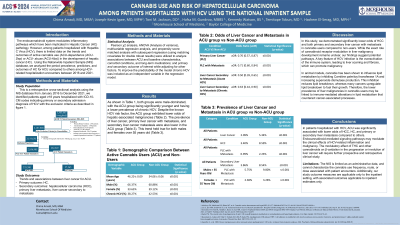Sunday Poster Session
Category: Liver
P1149 - Cannabis Use and Risk of Hepatocellular Carcinoma Among Patients Hospitalized With HCV Using the National Inpatient Sample
Sunday, October 27, 2024
3:30 PM - 7:00 PM ET
Location: Exhibit Hall E

- CA
Chima Amadi, MD, MBA
Morehouse School of Medicine
Atlanta, GA
Presenting Author(s)
Chima Amadi, MD, MBA1, Joseph-Kevin Igwe, MD, MPH2, Toni M. Jackson, DO3, Hafsa M. Gundroo, MBBS1, Kennedy Watson, BS1, Temitope Tobun, MD1, Hashem El-Serag, MD, MPH2
1Morehouse School of Medicine, Atlanta, GA; 2Baylor College of Medicine, Houston, TX; 3Morehouse School of Medicine, Far Rockaway, NY
Introduction: The endocannabinoid system modulates inflammatory pathways which have been implicated in HCC pathology. However, among patients hospitalized with Hepatitis C Virus (HCV), there is limited data on the trends and outcomes of active cannabis use (ACU-dependence (ACU-Dep) or ACU- abuse (ACU-Abs)) in the development of hepatocellular carcinoma (HCC). Using the Nationwide Inpatient Sample (NIS) database, we analyzed the period prevalence, predictors, and outcomes of HCC for ACU compared to others among HCV-related hospitalization encounters between 2016 and 2021.
Methods: In a retrospective cross-sectional analysis using the 2016-2021 NIS database, we identified patients aged ≥18 presenting with ICD-10-CM codes indicating a primary or secondary diagnosis of HCV (ICD-10-CM: B182, B1920, B1921). Patients with acute HCV infection, hepatitis B virus infection, alcoholic cirrhosis, hemochromatosis, autoimmune hepatitis, and primary biliary cirrhosis were excluded. Pearson χ2 analysis, ANOVA, multivariable regression analysis (MRA), and propensity score-matched analysis (PSM) was utilized to analyze significant associations between baseline characteristics, comorbid conditions, and long-term medications for primary outcome of interest: HCC. Chronic HCV(ICD-10-CM: B182) was incorporated separately into regression models and for subpopulation analyses.
Results: We identified 3,119,629 patient encounters with HCV meeting inclusion criteria, including 262,645 with ACU (ACU-Abs: 235,380; ACU-Dep: 27,265). Among these, 42.17% had chronic HCV with a lower incidence of ACU compared to others (38.27% vs 42.53%, p≤0.001, respectively). ACU patients were younger (46.20±0.09 vs 54.08±0.06, p≤0.001) and predominantly male (66.37% vs 60.88%, p≤0.001). There was a negative temporal relationship between ACU and HCC over time (Beta-Coefficient: -0.002, [-0.003, -0.001], p≤0.001). Moreover, ACU was associated with lower odds of HCC compared to others (aOR: 0.77, [0.71,0.84], p≤0.001), especially within the chronic HCV subpopulation (aOR: 0.70, [0.62,0.79], p≤0.001). ACU-PSM analysis demonstrated lower odds of HCC for ACU (aOR: 0.52, [0.48,0.57], p≤0.001), with lower odds for ACU-Dep compared to ACU-Abs (aOR: 0.49,[0.35,0.70], p≤0.001).
Discussion: In patients hospitalized with HCV, ACU was associated with significantly lower odds of HCC compared to others. Cannabinoid-mediated signaling may reduce the risk of HCV-related HCC. Further studies are needed to evaluate outcomes in this population group.
Disclosures:
Chima Amadi, MD, MBA1, Joseph-Kevin Igwe, MD, MPH2, Toni M. Jackson, DO3, Hafsa M. Gundroo, MBBS1, Kennedy Watson, BS1, Temitope Tobun, MD1, Hashem El-Serag, MD, MPH2. P1149 - Cannabis Use and Risk of Hepatocellular Carcinoma Among Patients Hospitalized With HCV Using the National Inpatient Sample, ACG 2024 Annual Scientific Meeting Abstracts. Philadelphia, PA: American College of Gastroenterology.
1Morehouse School of Medicine, Atlanta, GA; 2Baylor College of Medicine, Houston, TX; 3Morehouse School of Medicine, Far Rockaway, NY
Introduction: The endocannabinoid system modulates inflammatory pathways which have been implicated in HCC pathology. However, among patients hospitalized with Hepatitis C Virus (HCV), there is limited data on the trends and outcomes of active cannabis use (ACU-dependence (ACU-Dep) or ACU- abuse (ACU-Abs)) in the development of hepatocellular carcinoma (HCC). Using the Nationwide Inpatient Sample (NIS) database, we analyzed the period prevalence, predictors, and outcomes of HCC for ACU compared to others among HCV-related hospitalization encounters between 2016 and 2021.
Methods: In a retrospective cross-sectional analysis using the 2016-2021 NIS database, we identified patients aged ≥18 presenting with ICD-10-CM codes indicating a primary or secondary diagnosis of HCV (ICD-10-CM: B182, B1920, B1921). Patients with acute HCV infection, hepatitis B virus infection, alcoholic cirrhosis, hemochromatosis, autoimmune hepatitis, and primary biliary cirrhosis were excluded. Pearson χ2 analysis, ANOVA, multivariable regression analysis (MRA), and propensity score-matched analysis (PSM) was utilized to analyze significant associations between baseline characteristics, comorbid conditions, and long-term medications for primary outcome of interest: HCC. Chronic HCV(ICD-10-CM: B182) was incorporated separately into regression models and for subpopulation analyses.
Results: We identified 3,119,629 patient encounters with HCV meeting inclusion criteria, including 262,645 with ACU (ACU-Abs: 235,380; ACU-Dep: 27,265). Among these, 42.17% had chronic HCV with a lower incidence of ACU compared to others (38.27% vs 42.53%, p≤0.001, respectively). ACU patients were younger (46.20±0.09 vs 54.08±0.06, p≤0.001) and predominantly male (66.37% vs 60.88%, p≤0.001). There was a negative temporal relationship between ACU and HCC over time (Beta-Coefficient: -0.002, [-0.003, -0.001], p≤0.001). Moreover, ACU was associated with lower odds of HCC compared to others (aOR: 0.77, [0.71,0.84], p≤0.001), especially within the chronic HCV subpopulation (aOR: 0.70, [0.62,0.79], p≤0.001). ACU-PSM analysis demonstrated lower odds of HCC for ACU (aOR: 0.52, [0.48,0.57], p≤0.001), with lower odds for ACU-Dep compared to ACU-Abs (aOR: 0.49,[0.35,0.70], p≤0.001).
Discussion: In patients hospitalized with HCV, ACU was associated with significantly lower odds of HCC compared to others. Cannabinoid-mediated signaling may reduce the risk of HCV-related HCC. Further studies are needed to evaluate outcomes in this population group.
Disclosures:
Chima Amadi indicated no relevant financial relationships.
Joseph-Kevin Igwe indicated no relevant financial relationships.
Toni Jackson indicated no relevant financial relationships.
Hafsa Gundroo indicated no relevant financial relationships.
Kennedy Watson indicated no relevant financial relationships.
Temitope Tobun indicated no relevant financial relationships.
Hashem El-Serag indicated no relevant financial relationships.
Chima Amadi, MD, MBA1, Joseph-Kevin Igwe, MD, MPH2, Toni M. Jackson, DO3, Hafsa M. Gundroo, MBBS1, Kennedy Watson, BS1, Temitope Tobun, MD1, Hashem El-Serag, MD, MPH2. P1149 - Cannabis Use and Risk of Hepatocellular Carcinoma Among Patients Hospitalized With HCV Using the National Inpatient Sample, ACG 2024 Annual Scientific Meeting Abstracts. Philadelphia, PA: American College of Gastroenterology.
